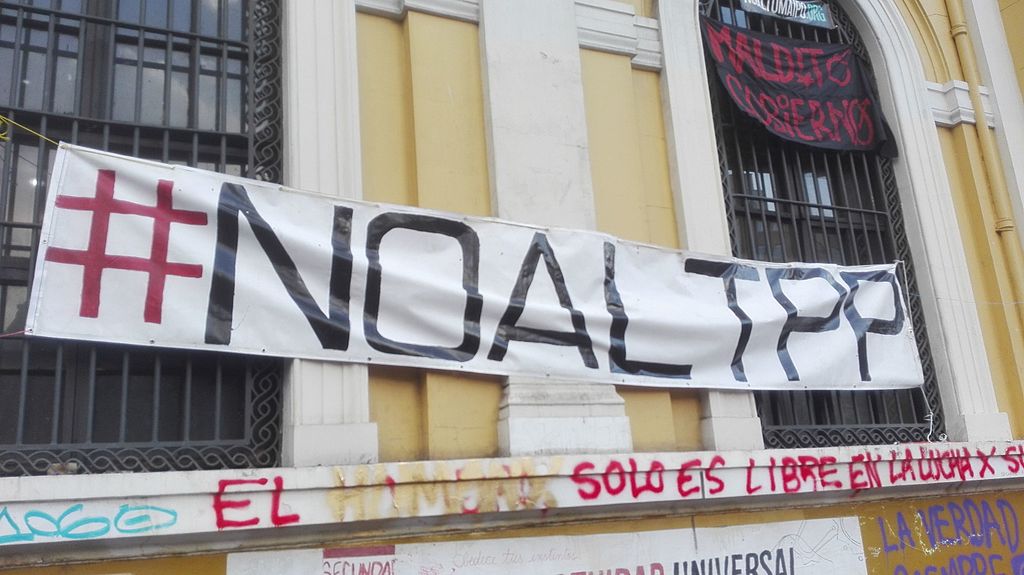Chile and the Trans-Pacific Partnership
by Dan Morgan, Chile
The clearest sign yet that politics in Chile have changed: the TPP-11. Whatever is that?
For years now, new kinds of international ‘trade’ treaties have been secretly negotiated – one for countries around the Atlantic, and one in the Pacific area. For the Pacific, the grand title now is “Comprehensive and Progressive Agreement for Trans-Pacific Partnership”. The less formal name is ‘Trans-Pacific Partnership’ or TPP. It was negotiated by 12 countries – and not just national politicians but also, crucially, representatives of trans-national corporations. Then Donald Trump withdrew the USA from the treaty, so now we call it the TPP-11. These treaties are much more than free trade treaties, as commerce accounts for only 5 sections of 30. The key points give enormous powers to the trans-national corporations in sections dealing with protections for foreign investment and intellectual property rights. China, significantly, is not a signatory. It is not going to open up to blackmail by trans-national corporations. Other countries, such as Vietnam and Canada, have not signed certain sections.
CHILE
So what happened in Chile? Governments of the right and ‘centre-left’ (mainly the latter) took part in the secretive negotiations, agreed everything and expected a rubber-stamp ratification in Congress. All free trade agreements had gone through on the nod before, and this was to be no different. It was not to be. Some troublesome ecologists and indigenous people began to make noises about the threat to the free use of traditional seeds. Other economists raised questions about national sovereignty. Some members of Congress, deputies of the Broad Front and Communist Party, began to take notice. Soon there was a fully-fledged campaign fuelled by active WhatsApp groups - mainly ecologists and left-wing deputies. The TPP requires implementation of the International Convention for the Protection of New Varieties of Plant, that facilitates the patenting of traditional seeds by subterfuge. It reinforces and extends the rights of corporations to sue national governments that do anything to infringe on their ‘reasonable expectations’ of profits from activities in the country. It sets up yet another system of international arbitration, where corporations can sue governments, but not the other way round. It is biased in favour of the companies. Repeat work for arbitrators depends on the agreement of the corporations, among other factors.
Four aspects of the treaty limit national sovereignty, in favour of the trans-nationals. They are the prohibition of requirements for technology transfer, restriction on policies for public contracts and for publicly owned companies, and the prohibition of export taxes. So policies aimed at real national economic development, moving away from the extractivist model of export of raw materials and unprocessed products, are blocked. The drastic changes in economic life needed to implement a Green New Deal would be blocked. Stimulating production of high value-added products, let alone high technology industries, would be stifled. Increasing labour rights and conditions, encouraging cooperatives and new public enterprises, could all be punished by biased international arbitration. Nationalised companies could not be given special conditions to compete with the trans-nationals - shades of the European Union. This could include, for example, improvements in labour rights or wages. The ban on export taxes would mean, for Chile, there could be no tax on the export of copper concentrate. Such a tax would force companies to export only refined copper, or products with even more value-added and so boost the national economy. At the moment, concentrate accounts for 7 of every 10 ships exporting copper, so a ban or high tax would lead to a great reduction in CO2 production.
Could governments prevent the import of pesticides or pharmaceuticals suspected of being dangerous, while studies are made, in order to protect the population? No, that is specifically prohibited under Article 7.9, point 10 of the treaty.
In short, what is promoted as just another free trade agreement is in fact a treaty to tilt the balance of power severely towards trans-national corporations. National sovereignty goes out the window. It bans public policies which would move development away from the present model.
In Chile’s case, it already has free trade agreements with all the countries involved in the treaty and a government study predicts an increase of only 0.12% of GNP as a result of signing. Lots of TV time was dedicated to promoters of the treaty all using ‘free trade’ arguments but hardly ever mentioning other aspects which are all negative for Chile. But, armed with facts and powerful, concise and rigorous arguments from academics like Hassan Akram and José Gabriel Palma, a campaign of e-mails, press conferences, some TV time, lobbying and marches convinced many deputies to vote against the treaty in the House. All the Communist, Broad Front, Socialist and Democracy Party deputies voted against, plus most Radicals and three Christian Democrats. This, even though the President of the Democracy Party was Foreign Minister when the treaty was being negotiated and is strongly in favour of it. So the vote in favour was 77 to 68, a narrow victory. It is now in the Senate, where ‘traditional’ politicians have more sway. However, politics in Chile have changed, and the neoliberal consensus favouring big business and trans-nationals will not be the same again.

Protest against original TPP University of Chile






